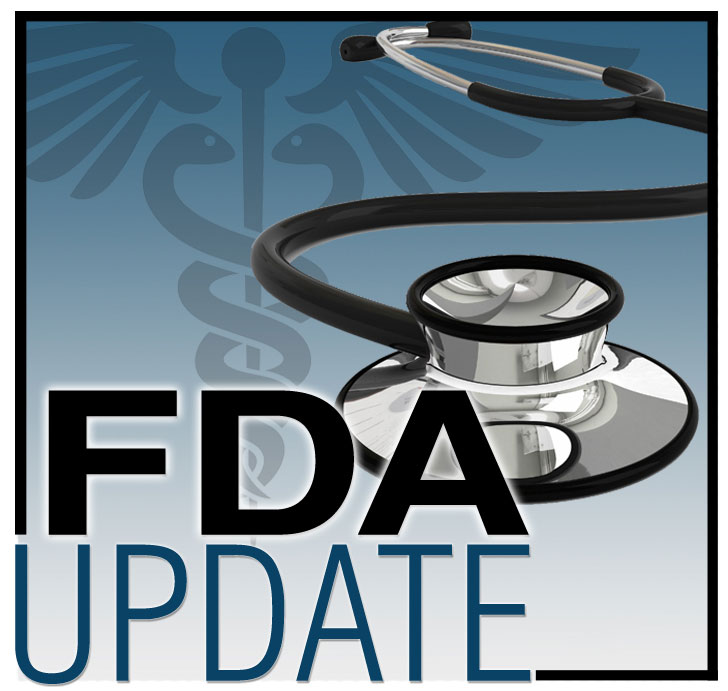
On November 16, 2017, the U.S. Food and Drug Administration (FDA) granted regular approval to obinutuzumab (Gazyva®, Genentech, Inc.) in combination with chemotherapy, followed by obinutuzumab monotherapy in patients achieving at least a partial remission, for the treatment of adult patients with previously untreated stage II bulky, III, or IV follicular lymphoma (FL).
Approval was based on a multicenter, open-label, randomized phase 3 trial (GALLIUM) for patients with previously untreated non-Hodgkin lymphoma, including 1202 patients with FL. Patients were randomized 1:1 to receive either obinutuzumab + chemotherapy or rituximab + chemotherapy, followed in responding patients by obinutuzumab or rituximab maintenance for up to 2 years. Of the patients with FL, 91% had stage III-IV disease, 44% had bulky disease, and 79% had at least intermediate-risk disease. The chemotherapy backbone was bendamustine in 57%, CHOP in 33% and CVP in 10%. With a median follow-up of 38 months, progression-free survival, as assessed by an independent review committee, was statistically significantly improved in the obinutuzumab arm, with an estimated hazard ratio of 0.72 (95% CI: 0.56, 0.93; p=0.0118) compared to the rituximab arm. Median progression-free survival was not reached in either arm. As assessed by CT, the arms had similar overall response rates (91% with obinutuzumab, 88% with rituximab) and complete remission rates (28% and 27%, respectively).
Among the 1385 patients evaluated for safety, the obinutuzumab arm had higher incidences of serious adverse reactions (ARs; 50% compared to 43% in the rituximab arm), grade ≥ 3 ARs (79% vs. 72%) and fatal infections (2% vs. < 1%). The most common ARs in the obinutuzumab arm (incidence ≥ 20% and ≥ 2% greater than in the rituximab arm) included infusion reactions, neutropenia, upper respiratory tract infection, cough, constipation and diarrhea. The most common grade ≥ 3 ARs (incidence ≥ 5%) observed more frequently with obinutuzumab were neutropenia, febrile neutropenia, thrombocytopenia and infusion reactions. Recipients of bendamustine had higher incidences of serious and fatal infections than recipients of CHOP or CVP.
In patients with previously untreated FL, the recommended dose-schedule of obinutuzumab is 1000 mg intravenously on days 1, 8 and 15 of cycle 1; 1000 mg on day 1 of cycles 2-6 or cycles 2-8; and then 1000 mg every 2 months for up to 2 years.
Full prescribing information is available.
FDA granted priority review to obinutuzumab for this indication. A description of FDA expedited programs is in the Guidance for Industry: Expedited Programs for Serious Conditions-Drugs and Biologics.
Healthcare professionals should report all serious adverse events suspected to be associated with the use of any medicine and device to FDA’s MedWatch Reporting System by completing a form online, by faxing (1-800-FDA-0178) or mailing the postage-paid address form provided online, or by telephone (1-800-FDA-1088).
Follow the Oncology Center of Excellence on Twitter @FDAOncology.
Check out recent approvals at the OCE’s new podcast, Drug Information Soundcast in Clinical Oncology (DISCO).
In collaboration with the FDA and as a service to our members, ONS provides updates on recent FDA approvals and other important FDA actions (e.g., updated safety information, new prescribing information) pertaining to therapies for patients with cancer. This allows the agency to inform oncologists and professionals in oncology-related fields in a timely manner. Included in the FDA updates is a link to the product label or to other sites for additional relevant clinical information. In supplying this information, ONS does not endorse any product or therapy and does not take any position on the safety or efficacy of the product or therapy described.





